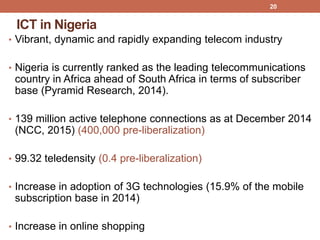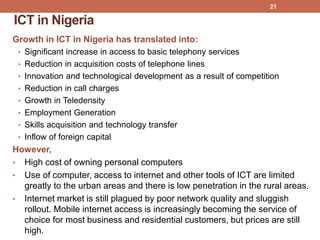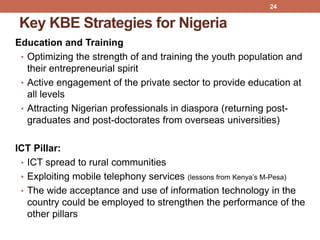The document discusses Nigeria's challenges and opportunities in transitioning to a knowledge-based economy (KBE) amidst its current reliance on crude oil and unskilled labor. It highlights the importance of education, ICT infrastructure, and innovation systems in enhancing economic growth and competitiveness, alongside comparisons with successful cases from countries like Sweden and Singapore. Key strategies for Nigeria include diversifying its economy, optimizing education and training, and fostering an environment conducive to innovation and ICT development.
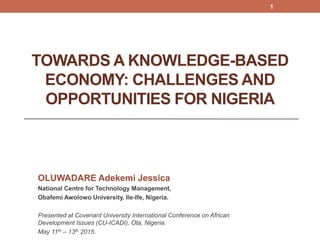
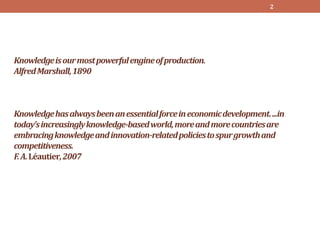
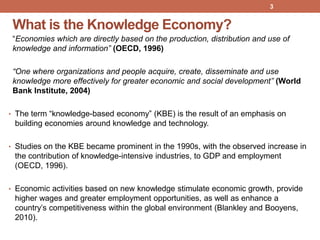
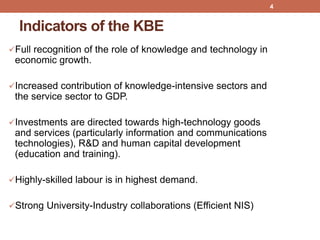
![The Problem?
• Global pattern of economic growth:
• Knowledge exploitation and the use of technology
• Africa’s pattern of economic growth:
• Exploitation of natural resources, leading to low level of competitiveness
[more than half of the 20 lowest ranked countries in the 2014 Global
Competitiveness Index (GCI), and 15 nations ranked among the least 20 nations
based on the 2012 Knowledge Economy ranking]
• Nigeria:
• Still driven by factor endowments, primarily crude oil and unskilled labour.
• Global Competitiveness ranking is 127th out of 144 economies in 2014
(WEF) and Knowledge Economy ranking is 119th position out of 145
economies in 2012 (World Bank).
• Yet to make significant progress in terms of the knowledge economy
(Radwan and Pellegrini, 2010).
• What are the immediate challenges and opportunities faced in transiting
towards a knowledge-based economy?
5](https://image.slidesharecdn.com/knowledgeeconomy-150524224028-lva1-app6891/85/Nigeria-Towards-a-Knowledge-Economy-5-320.jpg)
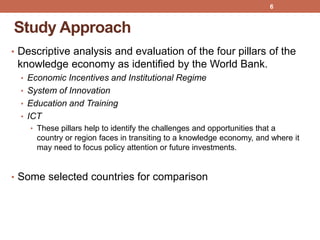
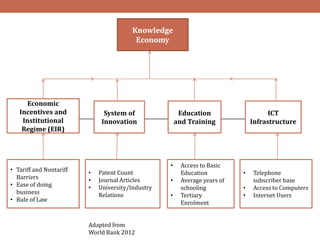
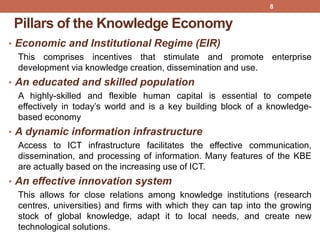
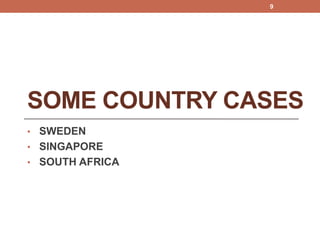
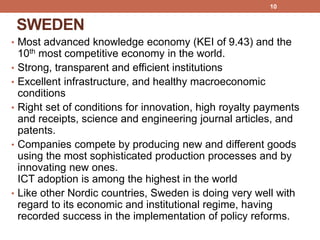






![Education and Training in Nigeria
• Large number of out-of-school children and young adults with
limited literacy skills. [Efforts on the implementation of the UBE
programme still needs to be enhanced].
• Brain drain
• Academic staff shortages in tertiary education [esp. S&T]
• Low capacity of universities to accommodate the burgeoning
student
• High emphasis on paper qualification
• Priority of theory over practice [inadequate for equipping
learners with the skills needed for active participation in the
global knowledge economy (Oseghale and Adeyomoye, 2011)]
• Deteriorating quality and insufficient investment.
• (From 2000 to 2006, the number of Nigerian students abroad became more than doubled,
from 10,000 to 22,000. In the US, Nigeria was the 17th and 19th largest source of
international undergraduates and graduate students, respectively in 2009/2010, and the
largest source of students from SSA - Education Fact Sheet, 2012).
17](https://image.slidesharecdn.com/knowledgeeconomy-150524224028-lva1-app6891/85/Nigeria-Towards-a-Knowledge-Economy-17-320.jpg)


